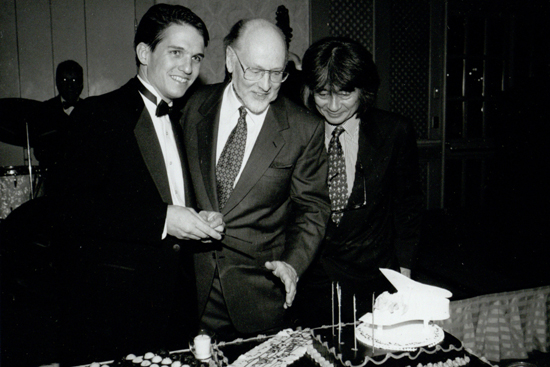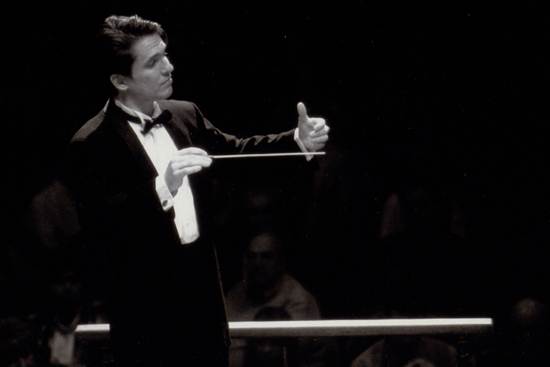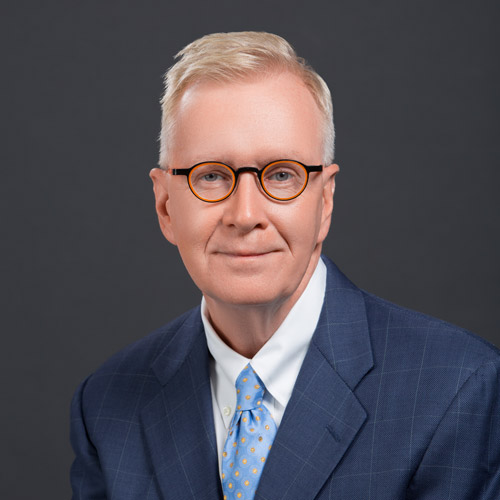Boston Pops Maestro Lockhart Speaks Tonight
Personal papers given to Gotlieb Archival Research Center
Keith Lockhart was just 35 in 1995 when he landed one of the most celebrated jobs in classical music: conductor of the Boston Pops orchestra. Since then, he’s conducted more than 1,500 Pops concerts, recorded 12 albums, and accrued 2 Grammy nominations. And that’s just his full-time job.
Since 2007, Lockhart has been artistic advisor and principal conductor of the Brevard Music Center and Festival in the Blue Ridge Mountains of North Carolina, one of the country’s leading institutions for gifted young musicians. He’s also principal conductor of the BBC Concert Orchestra, based in London, and he can be heard each weekday on WGBH 99.5 FM, where he shares stories about composers and performers in the series Keith’s Classical Corner.
As head of the Pops, Lockhart (Hon.’04) has shown a talent for performing both classical and popular repertoire. He’s as much at ease leading the orchestra in Broadway show tunes and popular standards as he is in performing Beethoven, Ravel, and Mozart.
He’s become one of the nation’s leading ambassadors of music, as well as one of the most recognizable, thanks largely to his annual televised Fourth of July concerts on the Boston Esplanade and at such popular venues as the 2002 Winter Olympics in Salt Lake City, the Super Bowl in New Orleans in 2002, and last year’s Diamond Jubilee concert in London for Queen Elizabeth.
The still boyish-looking Lockhart has also gained plaudits for championing the music of young composers and performers. Ben Folds, My Morning Jacket, Aimee Mann, and Amanda Palmer have all appeared with the Pops under his baton.
Lockhart recently donated his papers to the Howard Gotlieb Archival Research Center (HGARC) at Boston University, which houses more than 2,000 historical, literary, and contemporary collections, among them the papers of legendary Pops conductor Arthur Fiedler (Hon.’51), who helmed the orchestra for 50 years. As part of HGARC’s Friends Speakers Series, Lockhart will be on campus tonight to talk about his career. The event, free to BU students with a valid ID ($25 for the general public) will begin at 5:30 p.m. in the George Sherman Union Metcalf Ballroom.
“I pursued Keith Lockhart for his archive because he is an internationally renowned maestro,” says HGARC director Vita Paladino (MET’79, SSW’93). “Keith’s contribution to the Boston Pops has been very important to its evolution, and his work with the BBC orchestra and his other conducting duties make him an international figure in contemporary orchestral music.”
Among the 29 cartons of memorabilia Lockhart has donated so far (some of which will be on display at tonight’s event) are an undated letter from New England Patriots quarterback Tom Brady thanking Lockhart for a gift of Pops Christmas CDs, a note from actor and banjo player Steve Martin following Martin’s appearance with the orchestra last spring, and a photo of the conductor throwing out the first pitch at a 2009 Red Sox game.

Lockhart, who is about to launch his 19th season with the Pops (Megan Hilty of NBC’s Smash and Matthew Morrison, the star of Glee, are among the guests who will be performing with the orchestra), spoke with BU Today about his career, the challenges of getting young audiences to listen to symphony orchestras, and his advice for aspiring musicians.
BU Today: You took up piano at age seven. At what point did you know you wanted to be a conductor?
Lockhart: I conducted various things while still in high school, but it wasn’t until late in my undergraduate time, finishing degrees in piano performance and German at Furman University, that, responding to a teacher’s challenge, I began to consider conducting as a possible career.
How would you describe the mission of the Boston Pops, and what do you envision for the orchestra?
We are the orchestra for people who don’t know they like orchestras. Our mission is to perform the widest possible repertoire for the widest possible audience. We think of ourselves as the ultimate outreach tool of the orchestral music industry. My illustrious predecessor Arthur Fiedler once said, “We only play one kind of music at the Boston Pops…the interesting kind.” We like to think that’s still true.
When I first came to Boston as a relatively young 35-year-old conductor, I met people my age who said, ‘We’re so glad you’re here; my parents love the Pops!’ It struck me that we needed to continue to address new audiences, and that simple reverence for a now 128-year-old institution wasn’t enough. The Pops have the power to be a potent force in connecting millions of people with the glories of great music, one of the greatest treasures our culture has produced.
Speaking of Fiedler, how have musical tastes changed from the era when he conducted the Pops to today?
The “popular music” performed by Arthur Fiedler in the ’40s and ’50s consisted mostly of lushly orchestrated Broadway musicals and Nelson Riddle arrangements for Frank Sinatra tunes. With the advent of electronica—from Chuck Berry and the Beatles to the present day—the job of translation to our sound world has become much harder. Our response has been to focus on music that we can wear easily and well—world music, for instance—and the music of acoustically oriented indie-rock bands and singer-songwriters.
As Pops conductor, you have to straddle the worlds of classical music and popular music. How do you do that?
Two things come to mind: one, that we always try to ensure that the Boston Pops is the star of its own show, no matter how big a star we’re appearing with. Second, I try to think about the type of audience who will be attending and make sure that everyone in the room leaves thinking that there’s at least one piece on the program that we put there just for them.

Much has been made of the shrinking audience for live classical music—how much does that concern you and how are you addressing it?
In 1911, I believe, the music critic Philip Hale wrote an article in a Boston newspaper where he decried the graying of the classical audience and said that if the trend wasn’t reversed, there would be no audience by 1925. The rumors of our death have always been overexaggerated. That having been said, we live in an age of previously unparalleled change in the way we interact with each other and our culture. The internet age has created a “separate pod” mentality that is antithetical to what we try to create as artists. We have to sell the value of joining your fellow humans in the process of art being made. If we can’t sell that, and lose out to virtual reality, then we and our world stand to suffer greatly.
Attracting younger audiences is about planting a seed that will develop later, maybe much later, down the line. People who come to hear us with Amanda Palmer are not likely to show up the next week for a Leroy Anderson tribute, but it’s about making the point that the orchestra exists for people across all age brackets and musical tastes.
Besides the Pops, you conduct the BBC Concert Orchestra and are Brevard Music Center artistic advisor and principal conductor. How do you manage all that?
Those aren’t the tough parts. You should have asked me how I balance all that with having nine-year-old, three-year-old, and one-year-old sons. My life is very full, but very satisfying. I wouldn’t have it any other way.
You attended Furman and Carnegie Mellon Universities. Why did you decide to give your collection to the Gotlieb Center?
BU has such a fantastic archival collection, really unrivaled. Besides, although I have a great deal of affection for my alma mater, my life and career will always be viewed as Boston-centric, so it makes sense that the reference materials are here. I’m honored to share the same space with Arthur Fiedler, who really made this all possible. Talk about standing on the shoulders of giants.
What advice do you give to young people aspiring to a conducting career?
My first advice would be, don’t. After that, I would tell them what one of my teachers told me at Aspen in the summer of 1980, when I was just making the decision to go forward with this crazy idea that I could conduct for a living. He said, “This is a really difficult and unforgiving profession, but I can guarantee you that every one in this room [there were probably 15 of us] will have one, and probably only one, moment of opportunity. Be absolutely sure that you are prepared for that one moment. Chances are you won’t get a second one.” Still true.
Keith Lockhart speaks tonight, Wednesday, April 3, at 6 p.m. in the Metcalf Ballroom, George Sherman Union, 775 Commonwealth Ave., as part of the Howard Gotlieb Archival Research Center’s Friends Speaker Series. A cocktail reception precedes the event at 5:30 p.m. and follows the talk. Tickets are free for BU students and Friends of the Howard Gotlieb Archival Research Center (membership card required for admittance) and $25 for the general public. RSVP by calling 617-353-3697.


Comments & Discussion
Boston University moderates comments to facilitate an informed, substantive, civil conversation. Abusive, profane, self-promotional, misleading, incoherent or off-topic comments will be rejected. Moderators are staffed during regular business hours (EST) and can only accept comments written in English. Statistics or facts must include a citation or a link to the citation.